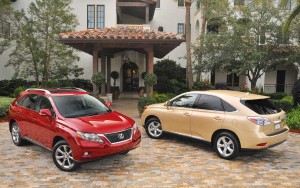
2010 Lexus RX: Up in a down market?
Since it made its debut, in 1998, as a 1999 model, the Lexus RX has set the benchmark all other luxury crossovers have taken aim at. But even the king-of-the-hill isn’t immune in a severe economic downturn.
After setting an all-time sales record, of just over 100,000 in 2007, sales of the last-generation RX took a sharp tumble, last year, netting just 81,000 sales as the dismal 2008 came to a close. Things haven’t looked much better since the start of 2008, but potential buyers might be excused for holding off, at least for the moment, what with the all-new, third-generation RX350 coming to market, this month – and the next-gen Lexus RX450h hybrid following a couple months later.
If the Toyota division’s Vice President Al Smith is on target, RX sales will jump again, with the introduction of the new models, with volumes nudging closer to 85,000 for 2009. “In this market, new product drives sales,” Smith asserts, and the statistics generally back that up. On the other hand, that bump doesn’t seem to last very long in this market, analysts caution.
That’s going to be critical, since Lexus, on the whole, has been stumbling as its single-biggest product line has lost momentum. Depending on any one model line is a major problem for an automaker, and one of the reasons why we’ve seen luxury makers steadily diversify their brand portfolios. It wasn’t all that long ago, for example, that the Mercedes-Benz line-up was, for all practical purposes, the C-, E- and S-Class models, with a few niche products, such as the SL. Today, Mercedes’ offers an alphabet soup of sedans, coupes, sports cars and crossovers, like the ML, GLK, CLS, R and SLK.
Lexus debuted, exactly 20 years ago, with just two models, the original ES and LS sedans. Today, its dealers also carry the IS, LX, and, of course, the RX. And besides the new version of that latter crossover, 2009 will bring the launch of the new IS-C coupe and convertible, as well as the Toyota luxury division’s first dedicated hybrid model, the HS250h.
Whether that means the glass is half-empty or filling up is a matter of debate. Many observers fret that a deep recession is the last time to be launching new products, which could debut stillborn. “We realize this is a very tough time to launch a new vehicle,” counters Smith. “We’re not immune to the current economic situation.”
But, as one of Lexus’ Japanese competitors noted, at the Chicago Auto Show, last week, “Stable is the new up.” Anything that can help Lexus hold its ground in a disastrously weak market is better than nothing, Smith contends.
